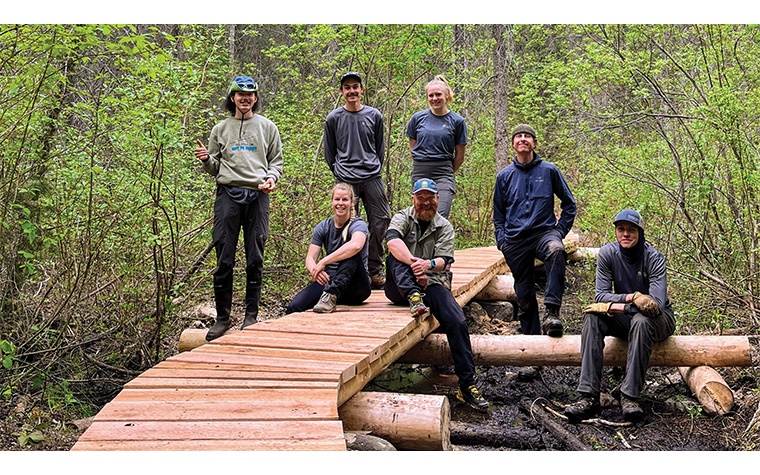
In the Columbia Basin, there’s no denying the presence of exceptional campsites and recreational trail networks, which are among the best in the province, if not the entire country. But what’s the secret behind their upkeep and management? It’s not by chance. The recreation crews formed through a partnership between Columbia Basin Trust and Recreation Sites and Trails BC are one of several such entities making a difference in the region.
Here are some impressive figures: 116 recreation sites and trails overseen, seven outhouses dug, 54 tables built, nine fire rings added, three kiosks put up, six entrance signs installed and nearly 200 kilometres of trail maintained and inspected, all in the Columbia Basin and all in the year 2023 alone.
As user numbers increase annually, there’s been a growing need to improve and upkeep recreation sites and trails. There’s a huge demand to develop the skills of Basin residents through employment opportunities and specialized training—which this program also does.
“We have people in the program who are returning for their fourth and fifth seasons,” says Kevin Eskelin, Regional Recreation Manager with Recreation Sites and Trails BC—Southern Interior East Region. “It is a stepping stone for career growth; we designed the program that way. We recently had our Nelson crew leader accept a position as an Auxiliary Recreation Technician. It’s working.”
Over five years, the program has created 66 jobs in the Basin, covering four recreation districts and overseeing 557 recreation sites and trails. For the 2024 field season, the four crews will have three members each, creating 12 seasonal positions in the Basin. Crew members gain useful skills and leadership experiences that will forever come in handy, while also having fun camping and making friends. “The campout trips have been a highlight! Doing big crew cookouts, having crib and Yahtzee tournaments after a day of trail building was really fun,” says Dexter Gauthier, crew leader for the Cranbrook crew in 2023. Based out of Cranbrook, Nelson, Revelstoke and Invermere, crew members and leaders are hired for about four months of field work. Training has a strong emphasis on safety in an outdoor setting, such as the proper use of hand tools, trail building, first aid, two-way radio communications and wildlife safety. “Most of our crew members come from an environmental background, which means they’re very capable in the outdoors. Our training builds on the skills they already have,” says Eskelin. Once crews are trained, boots hit the ground. Following project lists developed by area recreation officers, and working alongside local clubs and volunteers, the crews undertake tasks that range from reconnaissance and scouting to tree planting, to the installation of much-needed infrastructure like bridges, boardwalks, and tent pads.
“Trail building is such a rewarding job as you get to see the progress of your hard work each day. We had insightful conversations, funny conversations, and were lulled into the simplicity of moving dirt and rocks,” says Paula Martens, crew leader from Revelstoke in 2023. “Whether this year’s crew members ever fill another bucket up with dirt or haul heavy rocks, they have built up new resiliencies to move beyond what is comfortable. I believe we all learned lots this season and grew as workers together to strive to be our best.”
Remote work is not uncommon with helicopters and boats often part of the commute. Crashing in a tent after a long-day on the end of an axe or brush saw seemed like Club Med for the outdoor-loving bunch; dealing cribbage hands over the constant buzz of a mosquito swarm became commonplace as camaraderie blossomed amongst crew members. “The reward wasn’t just the view(s). To know that the work we did opened up a trail for the public to experience was the true reward and just part of what made it an unforgettable, skill-building, friendship-creating and life-changing season,” says Brennan Wittig, crew leader in Nelson in 2023.
The 2024 season will see an even stronger focus on collaborative work between crew members. More concentrated training will encourage overall team building, which in turn will enable crews to partner effectively on larger projects.
“Our crew members all have unique skillsets that we want to bring together on some cross-district work this year,” says Eskelin. “There are multiple benefits of having our crews work together, so we plan on making that happen more this season.”
It’s an additional goal for an already-successful program. The program has garnered positive attention elsewhere in the province and is working as a blueprint to build off, with 16 other recreation districts having adopted its approach.
“This program has allowed us to enable community vision. It’s been great to put our heads together and get some of these important projects complete,” says Eskelin. “We’re proud that the program has become a model.”
Since 2021, the program has helped create 152 positions, with an additional 42 slated for the upcoming season. In addition, since 2020, recreation-focused organizations have developed, enhanced or maintained over 450 kilometres of trails in the region with Trust support.
Columbia Basin Trust
